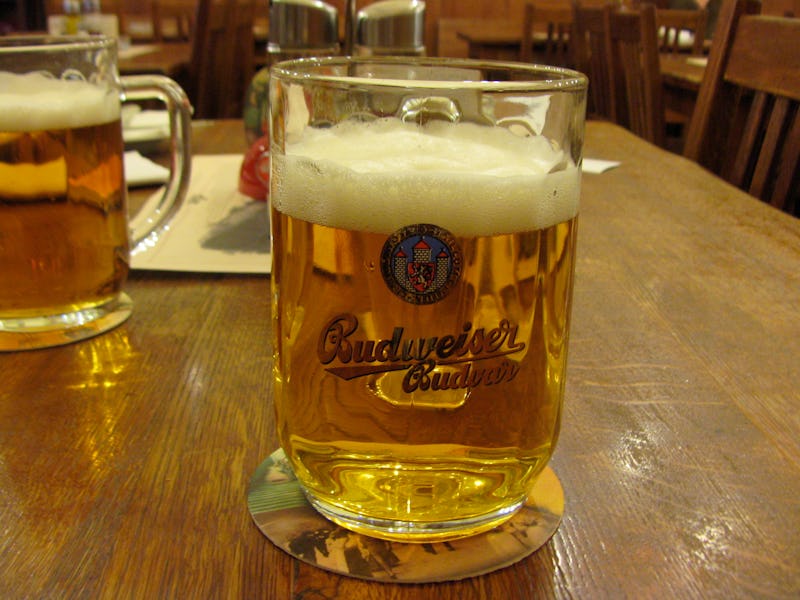If we fly to Mars, there’s a few things we can’t forget to pack: houses, protection (from solar winds, dummy!), and of course, beer.
At an SXSW panel on Saturday in Austin, Budweiser announced its “Bud on Mars” initiative, which includes bringing malt and other experiments aboard the International Space Station. Beer on Mars might sound far-fetched, but if we’re going to colonize the red planet, sooner or later drinking will happen, just like sex in space.
“While the idea poses considerable technical challenges, the concept — which may lend itself to some valuable initial test ideas and experiments on the space station — is valid and potentially worthy of consideration with respect to a commercial partnership,” former astronaut Clayton Anderson said at the panel.
Budweiser plans to examine how it can use the U.S. National Lab on the ISS to improve the company’s products and processes. In 2008, Sapporo brewed Space Barley, the first space beer ever, using barley grown on the ISS. Now, Budweiser wants to take this a step millions of miles further.
So far, “the King Of Beers” has started constructing experiments to bring barley malt to the space station to study how low Earth orbit effects these grains. Then, the grain will be brought back to Earth to be planted and tested.
“When we can enjoy a few ice-cold Buds on the red planet, that will be the moment when we can truly realize our dreams of space colonization,” Budweiser vice president Ricardo Marques said at the panel.
When in comes to microgravity brews, there’s the question of where to store the beer and how to keep the carbonation in. In the past, astronauts experimented with nonalcoholic carbonated beverages in the 1980s, but storing them in cans, cups, and dispensers were unsuccessful. With changes in temperature and pressure, the carbonation may escape prematurely.
Storing beer on Mars may be an issue because of its microgravity environment.
“When you have a Budweiser and you pop the top [of the bottle], the pressure inside is higher than outside, so things will happen. As soon as the lid is popped on Earth, you let it ‘fizz’ and you enjoy. In space, it ‘pops,’ and then maybe you’d need to clean everything,” Anderson said. “That would be an interesting dilemma to solve for the engineers at Anheuser-Busch.”
According to Vickie Kloeris, subsystem manager for ISS food systems at Johnson Space Center, the likely solution would be to store and drink beer from a pressurized container to keep the carbonation evenly distributed. Previously, Coca-Cola conducted an experiment by dispensing pop from a collapsible bag inside the bottle, which is internally pressurized and prevents carbonation from escaping.
NASA also said beer in space would become a “foamy mess”. When brewing beer, a combination of sugar and yeast produces bubbles, but they can’t rise in a zero gravity environment. Mars has gravity, but it’s one-third of what we’re familiar with here on Earth, so that might pose some issues to the brewing process.
Perhaps we might make use of the carbon dioxide in the Martian atmosphere to brew beer. Robert Zubrin, president of the Mars society, has worked with the Johnson Space Center to develop Pioneer Energy, which harvests, liquefies and stores carbon dioxide gas on Mars to create beer. In the meantime, Budweiser will have to research options to make microgravity beer work and possibly design its bottles differently.
“The problem with beer and with any other carbonated beverage in microgravity is how to keep the carbonation evenly distributed throughout the beverage,” Kloeris tells Inverse. “The tendency in microgravity will be for the carbonation to separate from the beverage itself.”
Since we’re so far from Mars, we might have to grow malt, rice, and hops either on Mars or a spacecraft. Scientists have already been experimenting with plants that may be able to grow on Mars, like potatoes, If we want to quench our thirst for beer, we might have to figure out how to plant grains there also.
However, beer is mostly water, and that’s going to pose another issue. Most of the water on Mars is ice, so we’ll either have to figure out a way to tap into these ice sources or import water.
And believe it or not, drinking beer in space would probably be an unpleasant experience. In microgravity environments, astronauts who drink beer will produce “wet burps.” In other words, there’s little gravity to draw liquids to the bottom of their stomachs and leave the gases at the top — and then when astronauts burp, they regurgitate some of the liquid.
Previously, Australia’s 4-Pines Brewing Co. created a “space beer”, which is made with low carbonation. If Budweiser follows suit for its microgravity brew, this might mitigate the problem of “wet burps.”
“All that said, NASA is and has been opposed to alcohol in space missions due to potential safety issues,” Kloeris says.
